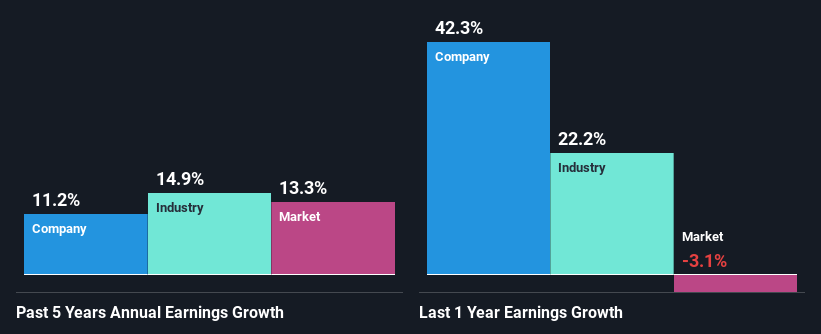- United States
- /
- Software
- /
- NasdaqGS:INTU
Could The Market Be Wrong About Intuit Inc. (NASDAQ:INTU) Given Its Attractive Financial Prospects?
It is hard to get excited after looking at Intuit's (NASDAQ:INTU) recent performance, when its stock has declined 3.8% over the past three months. But if you pay close attention, you might gather that its strong financials could mean that the stock could potentially see an increase in value in the long-term, given how markets usually reward companies with good financial health. Specifically, we decided to study Intuit's ROE in this article.
Return on equity or ROE is a key measure used to assess how efficiently a company's management is utilizing the company's capital. Simply put, it is used to assess the profitability of a company in relation to its equity capital.
See our latest analysis for Intuit
How Is ROE Calculated?
The formula for ROE is:
Return on Equity = Net Profit (from continuing operations) ÷ Shareholders' Equity
So, based on the above formula, the ROE for Intuit is:
16% = US$2.8b ÷ US$17b (Based on the trailing twelve months to January 2024).
The 'return' is the income the business earned over the last year. Another way to think of that is that for every $1 worth of equity, the company was able to earn $0.16 in profit.
What Has ROE Got To Do With Earnings Growth?
So far, we've learned that ROE is a measure of a company's profitability. Depending on how much of these profits the company reinvests or "retains", and how effectively it does so, we are then able to assess a company’s earnings growth potential. Assuming all else is equal, companies that have both a higher return on equity and higher profit retention are usually the ones that have a higher growth rate when compared to companies that don't have the same features.
Intuit's Earnings Growth And 16% ROE
To start with, Intuit's ROE looks acceptable. On comparing with the average industry ROE of 11% the company's ROE looks pretty remarkable. Probably as a result of this, Intuit was able to see a decent growth of 11% over the last five years.
As a next step, we compared Intuit's net income growth with the industry and were disappointed to see that the company's growth is lower than the industry average growth of 15% in the same period.

The basis for attaching value to a company is, to a great extent, tied to its earnings growth. The investor should try to establish if the expected growth or decline in earnings, whichever the case may be, is priced in. Doing so will help them establish if the stock's future looks promising or ominous. Is INTU fairly valued? This infographic on the company's intrinsic value has everything you need to know.
Is Intuit Efficiently Re-investing Its Profits?
Intuit has a three-year median payout ratio of 34%, which implies that it retains the remaining 66% of its profits. This suggests that its dividend is well covered, and given the decent growth seen by the company, it looks like management is reinvesting its earnings efficiently.
Besides, Intuit has been paying dividends for at least ten years or more. This shows that the company is committed to sharing profits with its shareholders. Our latest analyst data shows that the future payout ratio of the company is expected to drop to 20% over the next three years. Accordingly, the expected drop in the payout ratio explains the expected increase in the company's ROE to 24%, over the same period.
Conclusion
In total, we are pretty happy with Intuit's performance. Specifically, we like that the company is reinvesting a huge chunk of its profits at a high rate of return. This of course has caused the company to see a good amount of growth in its earnings. That being so, the latest analyst forecasts show that the company will continue to see an expansion in its earnings. Are these analysts expectations based on the broad expectations for the industry, or on the company's fundamentals? Click here to be taken to our analyst's forecasts page for the company.
New: AI Stock Screener & Alerts
Our new AI Stock Screener scans the market every day to uncover opportunities.
• Dividend Powerhouses (3%+ Yield)
• Undervalued Small Caps with Insider Buying
• High growth Tech and AI Companies
Or build your own from over 50 metrics.
Have feedback on this article? Concerned about the content? Get in touch with us directly. Alternatively, email editorial-team (at) simplywallst.com.
This article by Simply Wall St is general in nature. We provide commentary based on historical data and analyst forecasts only using an unbiased methodology and our articles are not intended to be financial advice. It does not constitute a recommendation to buy or sell any stock, and does not take account of your objectives, or your financial situation. We aim to bring you long-term focused analysis driven by fundamental data. Note that our analysis may not factor in the latest price-sensitive company announcements or qualitative material. Simply Wall St has no position in any stocks mentioned.
About NasdaqGS:INTU
Intuit
Provides financial management, payments and capital, compliance, and marketing products and services in the United States.
Outstanding track record with flawless balance sheet.
Similar Companies
Market Insights
Community Narratives



